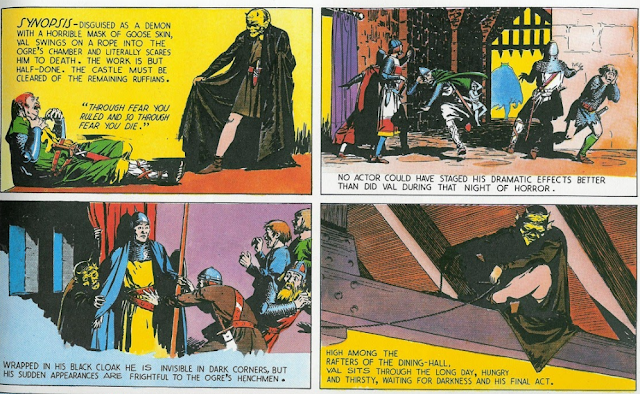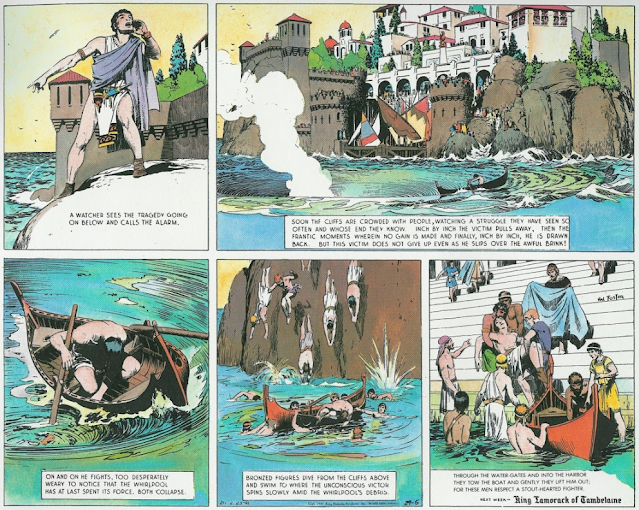I vaguely recall Prince Valiant being a TV cartoon when I was growing up. I remember dismissing it pretty quickly, I forget why.
Occasionally I'd see the comic strip in a newspaper, but I
didn't get how somebody could follow a story delivered in such tiny portions
over weeks and months.
Then some thirty years later I was talking with Sean McCoy about Mythic
Bastionland and he recommended checking out the old Prince Valiant comics.
As these comics started in 1937 I think I'm pretty late to
the party on this one, but it turns out they're really good. I'll lead
with a disclaimer that this comic has been heaped with praise over the last 80+
years, so there aren't many surprising insights here, but as this was a
blind-spot for me I thought it was worth talking about.
The artwork is lush, dynamic, and detailed, the stories break-neck paced, characters are archetypal but still surprisingly captivating.
Val often wins the day through brute force and plot armour,
but just as often has to resort to clever problem solving. He kludges together
makeshift a shield from his clothes, a lasso from his belt, disguises to trick
castle guards. When blocked by a horde of horsemen he scares their resting
steeds into stampeding over their camp. When overrun by a siege he tricks the
invaders into breaking through a false gate, leaving them trapped and bombarded
by rocks. Real OSR stuff. 
He's always journeying somewhere far away or eagerly
travelling back to Camelot. There are moments of adventure at each destination,
and respite back at home, but they don't linger for long.
A significant detail is the lack of speech bubbles that you might assume from a comic. Instead you get a small piece of narration alongside each piece of art, which you can enjoy mostly free from text.
It's not super deep, of course, but there's a sort of
driving pace and rich flavour to the whole thing that just keeps me excited to
see what happens next.
Lots of similarities to how I like to run RPGs.
Parallel to this, I had the Prince Valiant Storytelling
Game on my watchlist for a while, and finally managed to pick up a copy.
Written by Greg Stafford, it's an interesting contrast to Pendragon.
Some points of note:
Characters divide 7 points between just two Abilities, Brawn
and Presence, essentially physical-stuff and non-physical-stuff. With a maximum
of 5 points in either, you're essentially choosing between four different
profiles, and it gives the player a very immediate choice between two
directions for their character, and gently nudges you toward having an outright
weakness, as a score of 2 is considered "below average". Of course
the game totally cheats when it comes to the knightly characters from the comic,
making them above-average in both scores.
Skills are as you'd expect, adding to your Brawn or Presence
score as appropriate in specific situations. They're a good evocative list,
though, with things like breaking social skills into Courtesie, Glamourie,
Fellowship, and Oratory. This is a fine line to walk, but here it feels
appropriate.
It's essentially a die pool system, but you throw coins
instead of dice, counting the heads as successes. I like the simplicity of this
but hate the feel of it. Throwing a pile of coins feels innately less
satisfying to me than rolling a handful of dice. I'd just use d6s and count 4+
as successes, no mechanical difference.
It's one of those games where the GM sets a difficulty level
for the roll, typically 1-5 successes needed. Not a big fan of this, but it
does state that most tasks should just use a target of 3 successes
There's a weird system where if you roll all successes then
you get a complete success, giving you an extra success on the roll. I
guess this is there to give a chance of underdogs seizing a surprise victory,
but it has some odd effects. The example task given in the book is lifting a
rock (no, really) requiring 3 successes and using Brawn. It states "If you
had a Brawn of 2 or less you would have no hope of lifting the rock. If you had
a Brawn of 5 you would have a good chance of throwing three or more heads, thus
lifting the rock".
Well... it's not quite that simple. Throwing 2 coins gives a
25% chance of getting two heads, which would be a complete success, raising the
number of successes to 3 and lifting the rock.
Throwing 3 coins only gives a 12.5% chance of getting the
required 3 Successes, as getting just 2 doesn't trigger the complete success
bonus as before, so you need to get all 3 naturally. Strangely the Brawn 2
character is more likely to succeed than the Brawn 3 character.
To deal with the above I'd be tempted to try an alternative
die system to achieve the desired effect in another way. Roll the die pool as
normal. 5s count as one success, 6s count as two. Same mean result from each
die in the pool, but the distribution is slightly different.
Using this system the Brawn 2 Knight has an 8.3% chance of
lifting the rock while the Brawn 3 Knight has 20%. Seems a bit more like what
you'd expect. Certain tasks are harder with this system, others easier, but I
think it all works out alright.
Weapons, armour, and shields all simply add to the number of
dice/coins you throw in combat, but armour also subtracts it's value from
situations where it would be a hinderance. Nice and simple for a game that
isn't really about the specifics of how a sword is different than an
axe. If you've got Brawn 4, the Battle Skill at 2, a sword (1) and medium
armour (2) then you're totalling those up to roll 9 dice in this fight.
Combat and other opposed rolls see characters comparing the
number of successes rolled. The loser discards coins from their pool equal to
the difference in successes rolled, then the combat continues until one side
has lost all of their coins. Mass battles use a similar system with a few
little extras. It's fast, swingy, and gives ample opportunity for retreat or
surrender instead of fighting to the bitter end.
Fame is the goal of every Knight, and you earn it mainly
through succeeding at stuff. More Fame boosts your skills and there are some
nice touches where it can be compared with other characters to see if they
should defer to you socially, if you get a bonus to Presence around them, or
even if a particularly high presence is likely to cause would-be attackers to
think twice before engaging you.
The Advanced Rules section is a mixed bag. There are extra
skills, some of which eat into the areas covered by the core list. Alternative
character types are fun, opening up from the standard knights to allow Vikings,
monks, hunters, and other such options.
Also in this section is the Traits system, where your
character might be noted as Foul-Tongued, Reckless, Melancholic, Lustful, or
others from a pretty thorough list. This is kept secret from other players, but
you can sneakily show it to the GM right before you do something dramatic
linked to your trait. Let's say our Reckless knight charges into a battle they
cannot possibly win. If the GM approves, you get some more Fame points. It's
touching on the same ground as traits and passions in Pendragon and I actually
quite like this method. I might change my mind after seeing it in play, but it
feels nicely implemented to me.
There are a bunch of mini-scenarios called episodes in the
back of the book, and I picked up a supplement containing even more. They're
somewhat linear, but short enough that they probably avoid feeling too much
like a railroad. I can see them being fun if strung together across a more open
ongoing game.
Overall it's an interesting read and a valiant attempt
to create an RPG that focuses on pace and accessibility over rigorous detail.
Unfortunately this game is pretty hard to get hold of. I was lucky enough to get a second hand copy at a very reasonable price. If it sounds at all interesting to you then I'd recommend grabbing a copy if you spot one.
This post was originally sent as a reward to all Patreon supporters, and is released freely on this site the week after its original publication.
If you want to support my blog, podcasts, and video content then head over to my Patreon.




I haven't looked at the game, but is there a rule that says if your ability is lower than the difficulty, then you have no chance to succeed, even if you could get a special success? That would explain the rock example weirdness.
ReplyDeleteOn the other hand, Savage Worlds has had a very similar statistical wonkiness from its first iteration, so sometimes these things happen.
No, the Complete Success rule even states that "this gives characters a chance to succeed at tasks with a higher difficulty than their skill level" or similar.
DeleteYeah it doesn't break the game or anything, it's just one of those weird things.
Huh, that is weird.
Delete... Is the show any good?
ReplyDeleteMy memory is that it was poor, but I think I was a bit old for it.
DeleteMy grandfather was a huge fan of Hal Foster so I bought him the Fantagraphics reprint collections and the artwork is just stunning. Glad to see someone else appreciate them!
ReplyDeleteSpeaking of extremely rule-light systems... are you familiar with Tiny Dungeon?
ReplyDeleteI recognise the name but don't think I've read it. Would you recommend it?
DeleteQuite the opposite, actually.
DeleteTiny Dungeons looked like a runaway success, and I lean more and more towards rule light games, so I decided to try to invest a bit of money when they made a Bundle of Holding.
I wasn't particularly interested in the original game, tbh (which is minimalistic D&D, basically) but seeing that they were producing tons of stuff for SciFi, Horror, Post-Apocalypse, Superheroes etc... I thought that I could maybe cherrypick rules from the various books and tailor it to my own preference.
So I opted for the package that had the Superhero game as main item, and a few minor supplements (including "Tiny Gunslingers").
And this is my opinion of it: http://pa-mar.net/Hobbies/Games/TinyGunslingers.rw.html
This comment has been removed by the author.
Delete